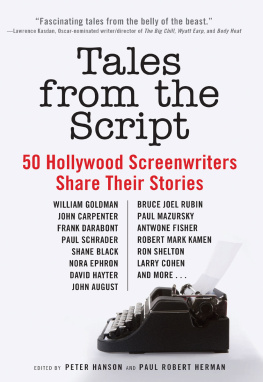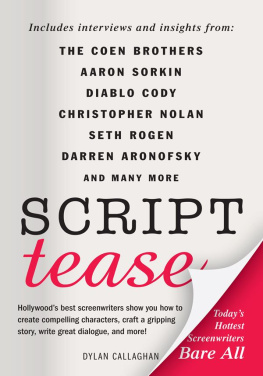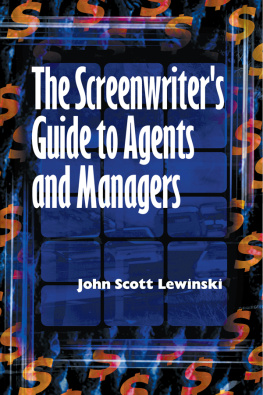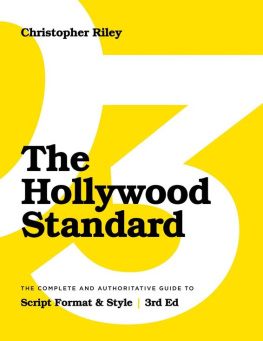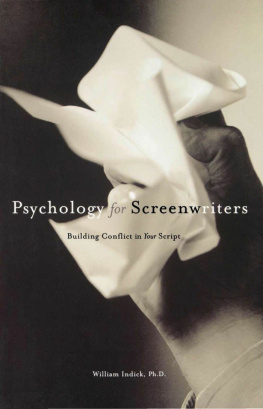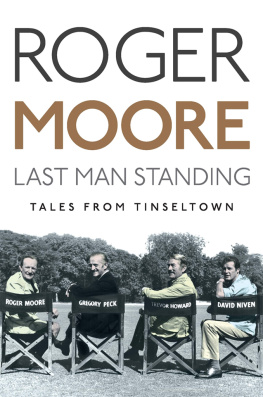For several months in late 2007 and early 2008, screenwriters took to the streets in an aggressive labor action that caught the worlds attention by cutting a TV season in half and stalling the production of numerous major films. The issue was nominally the monetization of new-media exhibition, but the underlying tensions were more troubling. The writer in Hollywood is truly an abused entity, notes Bruce Joel Rubin, an Academy Award winner for the screenplay of Ghost . It is really cruel on some levels that writers have so little participation in the work they create.
Yet in the midst of the strike, the film industry gave birth to that rarest of creatures: the celebrity screenwriter. The stunning success of Juno scribe Diablo Cody reminded everyone why screenwriters struck in the first place: Great movies begin with great ideas. In rare instances, someone like Cody gets to take the whole ride, sharing in the production and release of the film she wrote. More often, however, writers get left behind while actors, directors, and producers divide the limelight and the profits. That inequity motivates every writers strike: Those who plant the seeds watch others reap the harvest.
Nonetheless, the dream of writing the next Great American Screenplay has never been more popular. A cottage industry of books, magazines, and seminars encourages the aspirants who hope to turn their story ideas into three-picture deals, hit movies, and Academy Awards. For some, the dream reflects a noble desire to connect with the human community through storytelling. But for others, the dream is dangerous, because it is not grounded in a realistic understanding of the obstacles involved.
This book is intended for both types of dreamers.
If you want to write screenplays for the sheer love of movies, then the following chapters will give you all the inspiration you can handle. You will meet screenwriters like Justin Zackham, who surmounted a creative dry spell by writing the deeply personal script for The Bucket List , which enticed Morgan Freeman and Jack Nicholson to play the leading roles. Zackhams dream came true because he went after it on his own terms.
However, if you believe you can game the system by cynically assembling bits of other movies into a script that Hollywood cant resist, prepare to receive the most important education of your life. So few scripts actually become movies that if the only satisfaction you can derive from writing a screenplay is cashing the checks when it becomes a box-office smash, then you will quickly learn what it means to be unsatisfied.
No false promises are made that if you read these pages, you will learn the formula for writing a million-dollar screenplay; in fact, the dirty little secret of screenwriting books is that anyone who promises such formulas is lying. There is no one-size-fits-all advice for screenwriters, and thats why this book exists. Rather than simply detailing how people write movies, this book is an investigation into why people write movies.
If you finish this book bursting with enthusiasm to create your next script, then you have learned that you possess the stamina to pursue your dream despite the hardships you will face. And if you finish this book determined to steer clear of the minefields that endanger Hollywood screenwriters, then you have acquired a deeper admiration for the brave souls who step into the breach.
Tales from the Script lets screenwriters at every conceivable stage of their careers explain how they broke into Hollywood, how they turned early success into sustained employment, and how they endure the vicissitudes of a bruising professional environment without losing the creative spark that got them through the door in the first place. The goal of this book is to create the ultimate screenwriting panel discussion, in which newcomers and veterans can respond to and expand on one anothers insights, thereby painting the most complete portrait possible of what it really means to be a Hollywood screenwriter.
At first glance, the portrait these individuals paint may seem ugly. Most scripts dont sell. The majority of scripts that sell dont get made. And many scripts that get made are changed so extensively that by the time the movie is released, the original writer has to seek legal recourse to ensure that his or her name appears onscreen. On top of that, films that actually cross the finish line often turn out badly, because so many compromises have been made that the underlying concept has gotten buried in lousy ideas.
But on closer inspection, the portrait reveals a kind of savage beauty. Battle-scarred veterans still love what they do. Years after the initial sting of rejection, Frank Darabont can laugh about the fact that the Indiana Jones movie he spent a year writing was discarded. Now that time has passed since the movie flopped, William Goldman can compartmentalize the failure of his passion project, Year of the Comet , because he realizes it was the wrong movie at the wrong time. These are two of the most celebrated writers ever to pen screenplays, and they recovered from heartbreaking disappointments. That takes courage.
And more, it takes love. Love of story. Love of screenwriting. Love of movies. Because if you love something deeply enough, nothing can discourage you from trying to make that something part of your life.
This project was born during Paul Robert Hermans course work in UCLAs Professional Program in Screenwriting, when he conceived the idea of a nonfiction book about the rejection screenwriters face. Concurrently, Peter Hanson was in the midst of writing his first produced narrative feature, the latest project in an expansive career that has included books, films, and years in the trenches of regional journalism. When the two crossed paths, they joined forces to tackle the rejection project.
Over the course of three years, something broader took shape. This book and the documentary feature film of the same name offer a comprehensive look at the lives of screenwriters. The value of this book to beginning screenwriters, and even established professionals, is evident on every page; the appeal for movie buffs who relish behind-the-scenes anecdotes is equally significant.
Whatever your reason for picking up Tales from the Script , youre in for an experience as entertaining as it is enlightening. Screenwriters endure an infinite number of psychic body blows throughout their careers, but they still find the strength to conjure narratives that enthrall the entire world. The stories behind Hollywoods storytellers are as absurd, funny, shocking, and touching as any of the movies theyve ever written.

